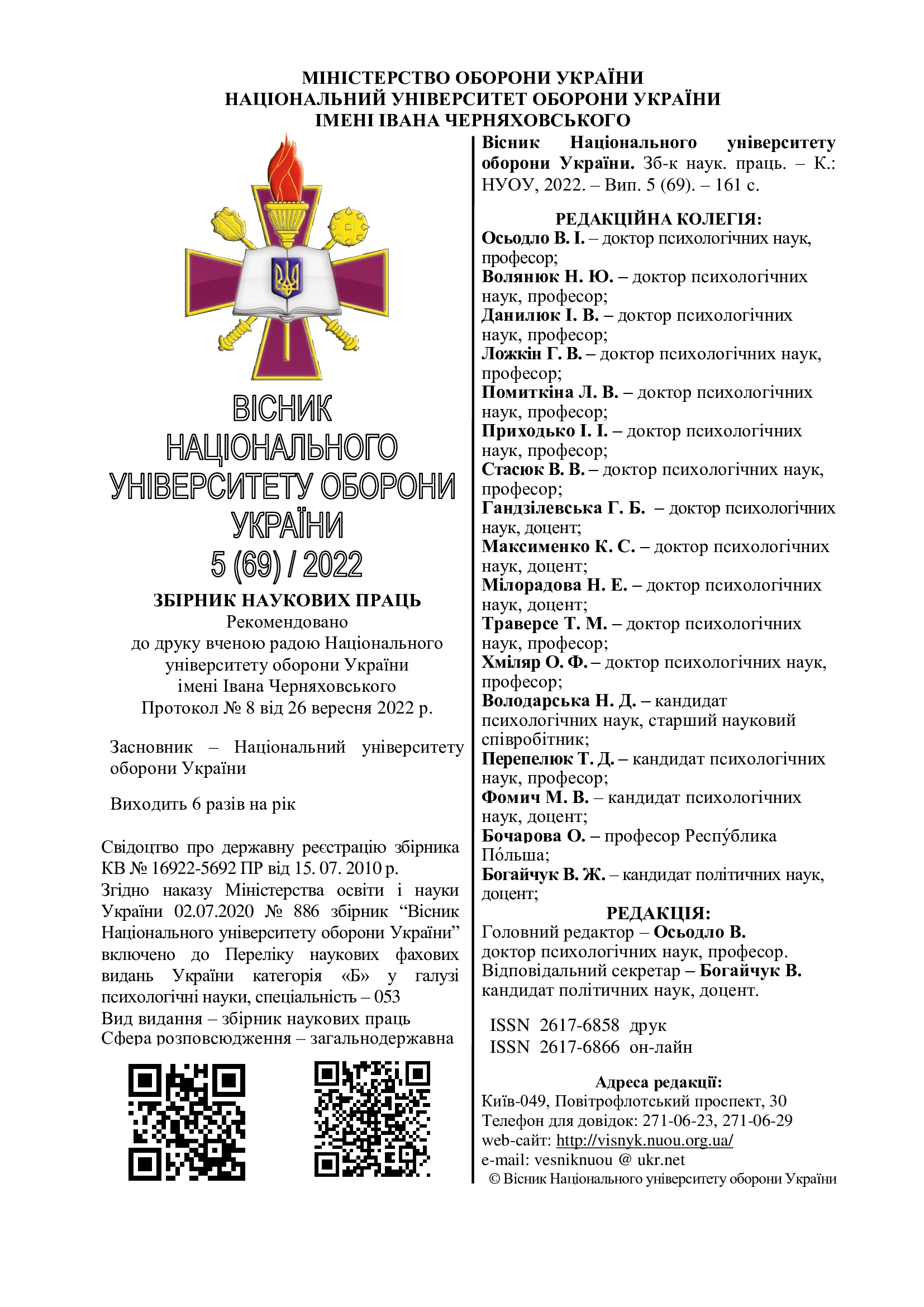ПРОБЛЕМА СУБ’ЄКТИВНОГО ПРОФЕСІЙНОГО БЛАГОПОЛУЧЧЯ ОСОБИСТОСТІ У СУЧАСНІЙ ПСИХОЛОГІЇ
DOI:
https://doi.org/10.33099/2617-6858-2022-69-5-12-20Ключові слова:
психологічне благополуччя;, суб’єктивне професійне благополуччя особистості;, модель професійного благополуччя.Анотація
Метою статті є теоретичний аналіз проблеми дослідження суб’єктивного професійного благополуччя особистості. Здійснено аналіз та систематизацію основних наукових підходів до визначення професійного благополуччя особистості, огляд різних напрямків його дослідження, аналіз сучасних і класичних моделей професійного благополуччя та їх компонентного складу, виявлено зміст і структуру досліджуваного феномену.
Завантаження
Посилання
Hall E. Aristotle’s Way: How Ancient Wisdom Can Change Your Life. London: The Bodley Head, 2018. 209 p.
Bradburn N. The structure of psychological well-being. Chicago: Aldine, 1969. 332 p.
Diener E., Oishi S. & Lucas R. Personality, culture, and subjective well-being: emotional and cognitive evaluations of life. Annual review of psychology, 2003. № 54, P. 403–425.
Lyubomirsky S. The how of happiness: A scientific approach to getting the life you want. New York: Penguin Press, 2008. 366 р.
Hjelle L., Ziegler D. Personality Theories: Basic Assumptions, Research, and Applications, 3th ed., New York: McGraw-Hill, 1992. 603 p.
Csikszentmihalyi, Mihaly. Finding Flow: The Psychology of Engagement With Everyday Life. New York: Basic Books, 1998. 192 p.
Ryff C. & Keyes C. The structure of psychological well-being revisited. Journal of Personality and Social Psychology. 1995. № 69(4), P. 719–727.
Seligman M. & Csikszentmihalyi M. Positive psychology: An introduction. American Psychologist. 2000. № 55(1), P. 5–14.
Warr P. How to think about and measure psychological well-being. / M. Wang, R.R. Sinclair, & L.E. Tetrick (Eds.), Research Methods in Occupational Health Psychology: Measurement, Design and Data Analysis. New York: Psychology Press, Routledge, 2013. P.76-90.
Van Horn J., Taris T., Schaufeli W. & Schreurs P. The structure of occupational well-being: A study among Dutch teachers. Journal of Occupational and Organizational Psychology. 2004. № 77, P. 365–375.
Bakker A. & Demerouti E. The job demands–resources model: State of the art. Journal of Managerial Psychology. 2007. № 22(3), P. 309–328.
Karasek R. Demand-control model : a social, emotional, and physiological approachto stress risk and active behaviour development / Stellman, J. M.(Ed.), Encyclopaedia of Occupational Health And Safety. Geneva : ILO, 1998. P. 34.06-34.14.
Войтенко О.В. Залученість персоналу організацій: основні підходи, чинники формування та практичне значення. Вісник національного університету оборони України. 2021. № 5(63). С. 27-35.
Voitenko E., Myronets S., Osodlo V., Kushnirenko K., Kalenychenko R. Influence of Emotional Burnout on Coping Behavior in Pedagogical Activity. International journal of organizational leadership. 2021. V.10. № 2, P. 183-196.
Волинець Н.В. Психологія особистісного благополуччя персоналу Державної прикордонної служби України : дис. … д-ра псих.н. : 19.00.01. Київ, 2020. 543 с.
Boekhorst J., Hewett R., Shantz A. & Good, J. The double-edged sword of manager caring behavior: Implications for employee wellbeing. Journal of Occupational Health Psychology. 2021. № 26(6), P. 507–521.
Liang L., Coulombe C., Brown D., Lian H., Hanig S., Ferris D. & Keeping L. Can two wrongs make a right? The buffering effect of retaliation on subordinate well-being following abusive supervision. Journal of Occupational Health Psychology. 2022. № 27(1), P. 37–52.
Aghbolagh M.B., Ardabili F.S. and Voitenko E. Content Analysis of Gossip at Different Levels. Organizacija. 2021. Vol.54. no. 4. P. 306-318.
Glavinska O., Ovdiyenko I., Brukhovetska O., Chausova T., Didenko M. (2020). Professional Self-Realization as a Factor in the Psychological Well-Being of Specialists of Caring Professions. Journal of Intellectual Disability-Diagnosis and Treatment, 2020. 8 (3), 548-559.
Zacher H. & Rudolph C. Strength and vulnerability: Indirect effects of age on changes in occupational well-being through emotion regulation and physiological disease. Psychology and Aging. 2022. № 37(3), P. 357–370.
Luthans F., Luthans K.W., Luthans B.C., Positive psychological capital: beyond human and social capital. Business Horizons. 2004. Volume 47, № 1, P. 45-50.





